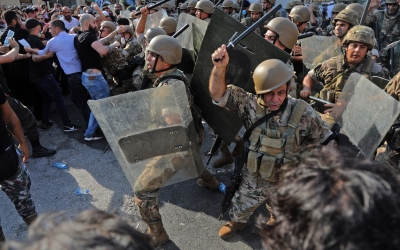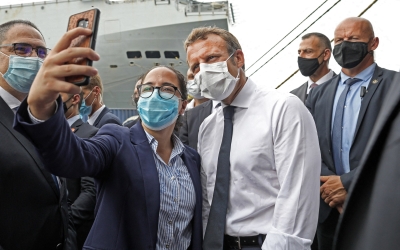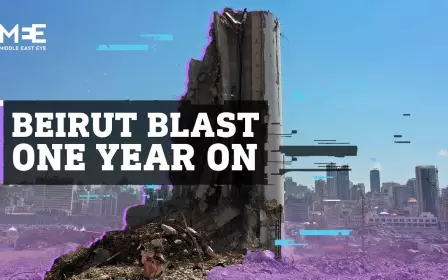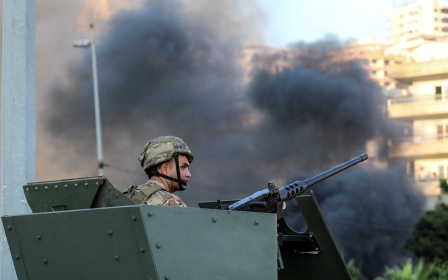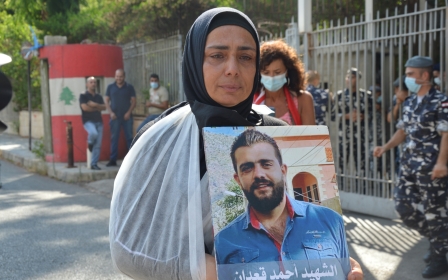Lebanon: International donors warn political elite during aid conference
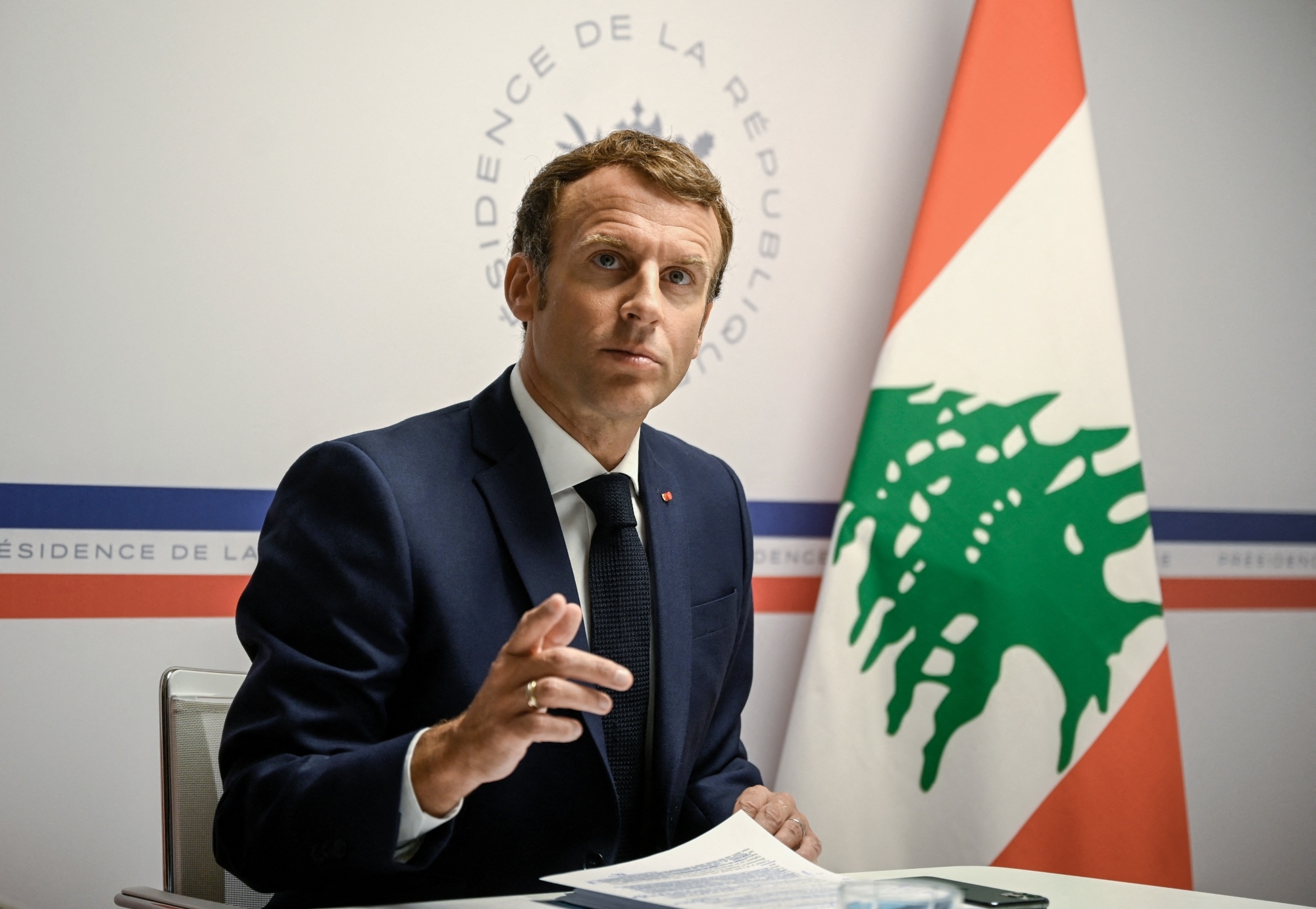
A UN-backed donor conference for Lebanon sought to raise much-needed funds for the crisis-wracked country on Wednesday, as the country marked the first anniversary of the Beirut port explosion.
US President Joe Biden promised $100m in additional aid for Lebanon, as he urged the nation to undergo reforms.
New MEE newsletter: Jerusalem Dispatch
Sign up to get the latest insights and analysis on Israel-Palestine, alongside Turkey Unpacked and other MEE newsletters
"Today I'm announcing nearly $100 million in new humanitarian assistance," Biden told the virtual conference led by France.
"But no amount of outside assistance will ever be enough if Lebanon's leaders do not commit to do the hard but necessary work of reforming the economy and combating corruption," he said.
"I send my deepest condolences to all those who were injured and lost loved ones and all those still struggling to recover from this trauma," Biden added. "We also recognise that the people of Lebanon have suffered more over the past year because of avoidable political and economic crises."
French President Emmanuel Macron, who aims to raise at least $350m in emergency aid for France’s former colony, said that Lebanese leaders "owe their people the truth and transparency" regarding the circumstances surrounding last year’s devastating blast.
On 4 August 2020, hundreds of tonnes of ammonium nitrate - a chemical compound used both in fertilisers or in bombs - which had been unsafely stored for years in Beirut’s port in the heart of the city, caught fire, leading to one of the biggest non-nuclear explosions in history.
The blast killed at least 214 people - some of whom are still not officially accounted for in government tallies - injured some 6,500 and left 300,000 homeless, as tens of thousands of homes were severely damaged.
One year on, full light has yet to be shed on the circumstances that led to the explosion and which officials were aware of the risk ahead of time.
A national investigation has yet to make much progress, as MPs have stalled to vote on the investigating judge’s request to lift immunity from prosecution for political figures and high-level security officials suspected in the case.
Lebanon’s political class - long accused of corruption and impunity since the country’s 15-year civil war - has been held responsible for the explosion by large swathes of the Lebanese public, who see the lack of political will to move the investigation forward as further proof of guilt.
"Lebanese leaders seem to bet on a stalling strategy, which I regret and I think is a historic and moral failure," Macron said in his opening remarks as host of the international donors' conference. "There will be no blank cheque for the Lebanese political system. Because it is they who, since the start of the crisis, but also before that, are failing."
Macron said France would offer ($118m) in French aid and a donation of 500,000 Covid-19 vaccine shots, while Germany pledged 40m euros ($47.5m) - as 40 world leaders in total were set to attend the virtual event.
Berlin also had harsh words for Lebanon’s political elite.
"Let me be frank: This crisis is mostly man-made. Lebanese political actors have not lived up to their responsibilities and to the legitimate expectations of the Lebanese people," German Foreign Minister Heiko Maas told the conference.
Unconditional aid, but threat of sanctions
Last year's conference in the wake of the blast raised about $280m, with the emergency aid being kept away from politicians and channelled through NGOs and aid groups.
The new aid will be unconditional, Macron's office said, but about $11bn raised for Lebanon in 2018 remains locked away and conditional on a series of reforms.
The international community is refusing to sign off on a bigger rescue plan until Lebanon has a new government that is committed to tackling corruption and undertaking economic reforms.
The EU said last week it was ready to impose sanctions on members of the ruling elite who obstruct attempts to improve governance and public sector accountability.
France has already barred several Lebanese officials from its territory, without publicly naming them.
Attending Wednesday's video conference, Lebanese President Michel Aoun appealed for international solidarity, while calling for “justice to be met” for victims of the blast.
"Lebanon is currently going through the hardest times," Aoun said. "Lebanon is counting on you, don’t let it down!”
Aoun pointed to ongoing government formation efforts as a sign, he claimed, that the country was on track to implement long-awaited reforms.
Lebanon has been without a government for all of the past year, after Hasan Diab resigned as premier in the wake of the explosion.
Former prime minister-designate Saad al-Hariri abandoned his efforts to form a new government last month, after nearly 10 months of failing to agree on its makeup with Aoun.
Najib Mikati, a wealthy businessman who has been prime minister twice before, became the new designated premier on 26 July. While Mikati had hoped to form a cabinet by the anniversary of the blast, squabbling over cabinet posts continues.
Critics have argued that no substantial changes in governance can truly take place so long as the same political figures continue to hold on to power.
On Tuesday, Human Rights Watch released a report of its own investigation into the explosion, which showed that a number of high-ranking officials - including Aoun and Diab - were aware of the dangers represented by the 2,700 tonnes of ammonium nitrate stored in the port since 2013.
Before the explosion Lebanon had already been suffering from a crippling economic crisis, which has since worsened to become one of “most severe” in the world since the mid-19th century.
Long fuel lines and shortages of basic medicines now mark daily life in the country, while the Covid-19 pandemic has stifled an uprising that began in late 2019 against the country’s longstanding elite.
Middle East Eye delivers independent and unrivalled coverage and analysis of the Middle East, North Africa and beyond. To learn more about republishing this content and the associated fees, please fill out this form. More about MEE can be found here.


